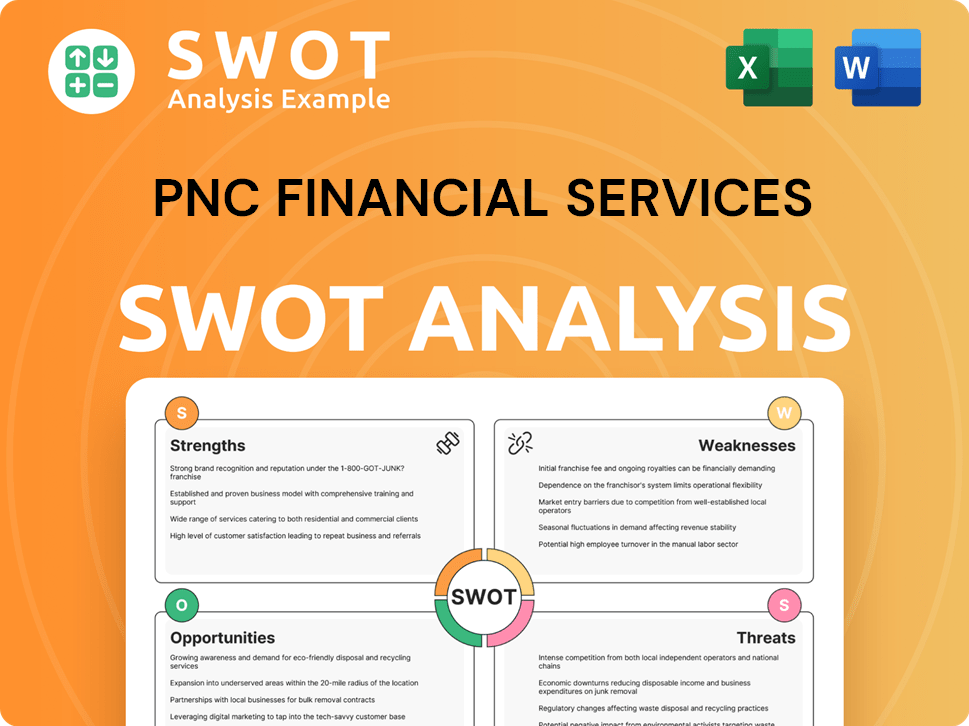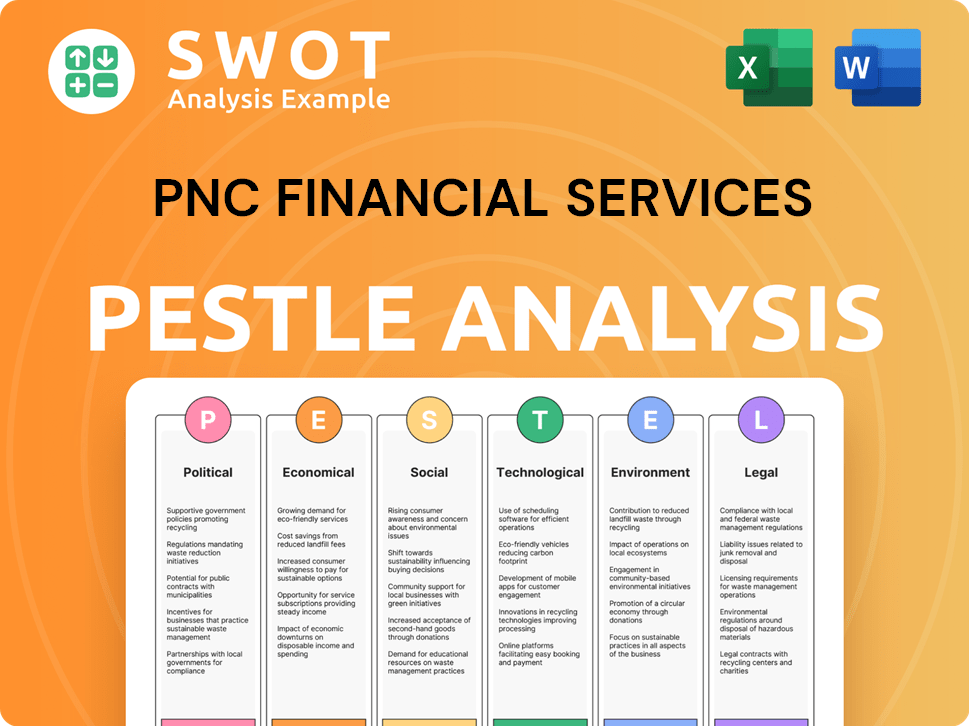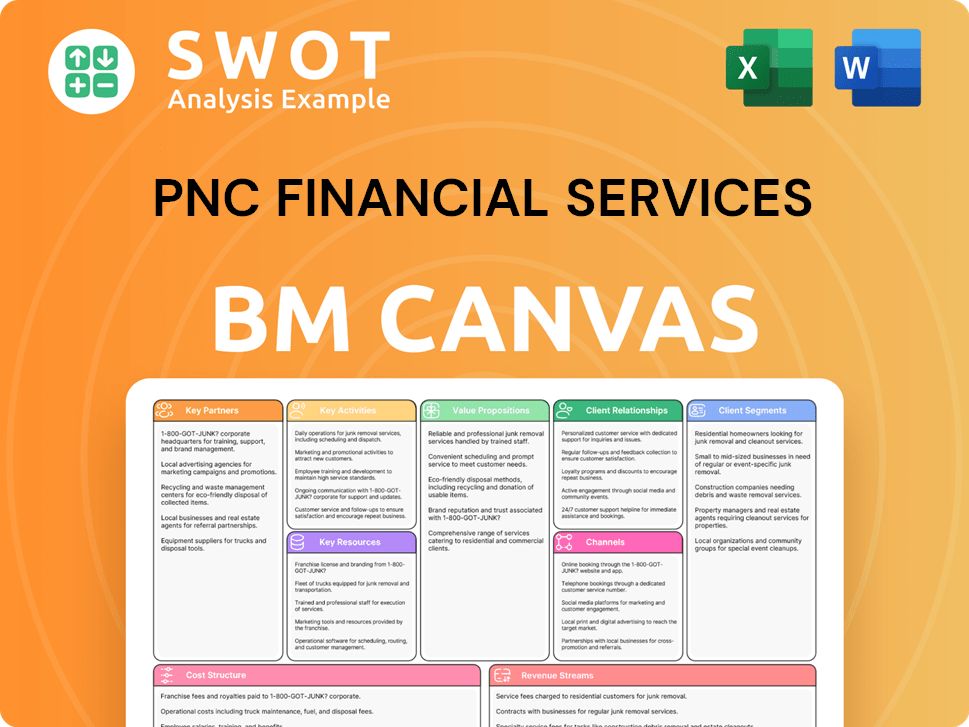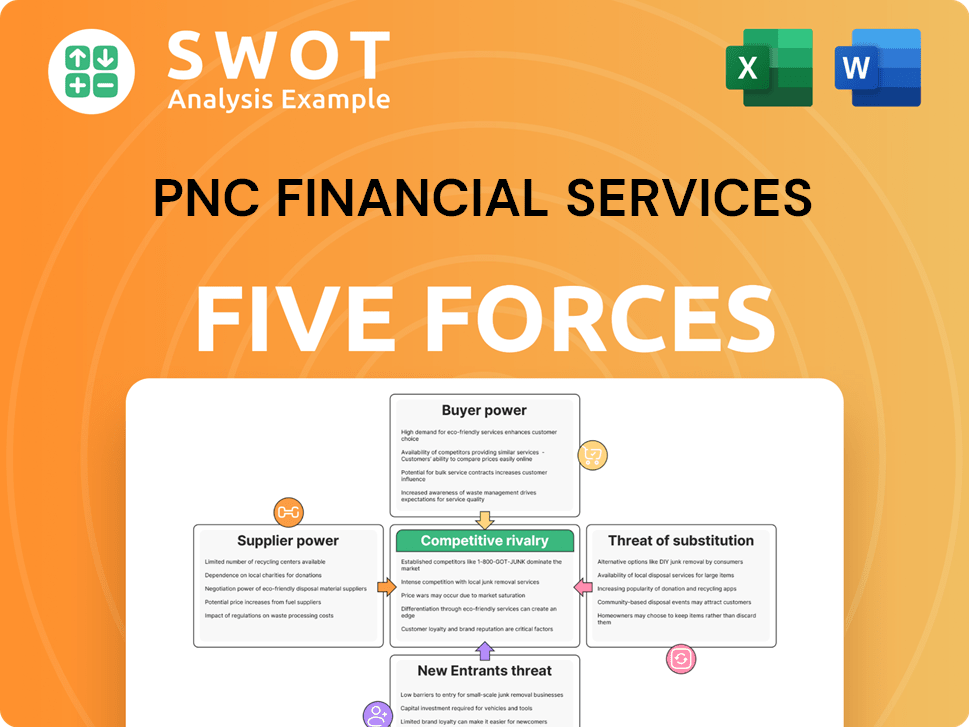PNC Financial Services Bundle
Can PNC Financial Services Continue Its Ascent in the Financial World?
PNC Financial Services Group has strategically navigated the complexities of the PNC Financial Services SWOT Analysis, consistently adapting its growth strategy to thrive in the ever-evolving financial services industry. Its acquisition of BBVA USA in 2021 marked a significant expansion, reshaping its market footprint and customer base. This article explores PNC's ambitious plans for future growth, offering a deep dive into its strategic initiatives and financial outlook.

From its roots in 1845, PNC Financial Services has evolved into a major player in the banking sector, driven by strategic mergers and acquisitions. This analysis will examine PNC's commitment to innovation and technology, alongside its expansion strategies, to understand its future prospects. We will assess how PNC is adapting to digital banking, its competitive advantages, and the potential impact of economic trends on its performance, providing a comprehensive view of its long-term growth potential.
How Is PNC Financial Services Expanding Its Reach?
PNC Financial Services' growth strategy is heavily reliant on strategic expansion initiatives designed to broaden its market presence and enhance its service offerings. These initiatives are crucial for navigating the dynamic financial services industry and capitalizing on emerging opportunities. The company's approach combines organic growth with strategic acquisitions, aiming to strengthen its position in key markets and diversify its revenue streams.
A significant aspect of PNC's expansion strategy involves leveraging digital technologies to improve customer experience and operational efficiency. The company continues to invest in digital banking platforms and innovative financial solutions to cater to the evolving needs of its customers. This focus on digital transformation is essential for maintaining a competitive edge and attracting a broader customer base in an increasingly digital world.
PNC's future prospects are closely tied to its ability to execute these expansion strategies effectively. By successfully integrating acquisitions, expanding its digital capabilities, and adapting to market changes, PNC aims to achieve sustainable growth and deliver value to its shareholders.
The acquisition of BBVA USA in 2021 was a pivotal move, significantly expanding PNC's footprint. This acquisition added approximately 2.6 million customers and 400 branches across seven states. The expansion bolstered PNC's presence in high-growth markets, including Texas, Arizona, and California.
PNC focuses on organic expansion within its existing footprint and targeted new markets. This includes opening new branches in strategic locations to capitalize on population and economic growth. The company also expands its loan portfolios across various business lines.
PNC emphasizes the digital expansion of its services to reach customers beyond its physical branch network. This involves investing in digital banking platforms and innovative financial solutions. The goal is to enhance customer experience and operational efficiency.
PNC continues to innovate its product offerings in areas such as digital banking, treasury management, and wealth management. The company also pursues strategic partnerships to enhance service capabilities and reach new customer demographics. This helps to maintain a competitive edge.
PNC's growth strategy involves a multi-faceted approach combining acquisitions, organic expansion, and digital transformation. The company aims to strengthen its market position and diversify its revenue streams. These strategies are crucial for long-term growth potential of PNC Financial Services.
- Strategic Acquisitions: Integrating acquired entities to expand market reach and customer base.
- Organic Growth: Opening new branches and expanding loan portfolios in key markets.
- Digital Innovation: Investing in digital banking platforms and services to enhance customer experience.
- Strategic Partnerships: Collaborating with other entities to expand service offerings.
PNC Financial Services SWOT Analysis
- Complete SWOT Breakdown
- Fully Customizable
- Editable in Excel & Word
- Professional Formatting
- Investor-Ready Format

How Does PNC Financial Services Invest in Innovation?
PNC Financial Services (PNC) recognizes that innovation and technology are vital for its growth strategy and future prospects. The financial services industry is rapidly evolving, and PNC is strategically positioned to leverage technological advancements to maintain a competitive edge. This focus is essential for adapting to changing customer preferences and market dynamics.
PNC's commitment to digital transformation is evident in its substantial investments in technology and its continuous efforts to enhance its digital platforms. This approach is not just about keeping pace; it's about leading the way in providing superior customer experiences and operational efficiency. The company's strategic initiatives are designed to drive long-term growth and value creation.
PNC's growth strategy is heavily reliant on its ability to integrate technology effectively across all aspects of its operations. The company's focus on digital banking, automation, and advanced analytics is central to its plans. By embracing these technologies, PNC aims to improve customer service, reduce costs, and expand its market share in the competitive financial services industry.
PNC is committed to digital transformation, incorporating automation, cloud-based solutions, and advanced analytics. This strategy enhances customer experience and operational efficiency.
PNC explores AI and ML for fraud detection, personalized recommendations, and improved operational efficiency. AI-driven tools enhance customer service effectiveness.
Cybersecurity investments are a priority for PNC to protect customer data and maintain trust. This is crucial for the continued use of digital channels.
PNC focuses on enhancing customer experience through superior digital interactions. This includes user-friendly online and mobile banking applications.
Automation of back-office processes and the use of advanced analytics contribute to significant operational efficiency. This reduces costs and improves service delivery.
PNC consistently invests in research and development to enhance digital platforms. This ensures the company remains at the forefront of technological innovation.
PNC's strategic initiatives for growth are closely tied to its technological advancements. The company's ability to adapt to digital banking trends and its investments in innovation are critical for its long-term success. The financial performance of PNC Financial Services is directly influenced by its ability to integrate technology and offer advanced services. For more insights, you can read about the Mission, Vision & Core Values of PNC Financial Services.
PNC's technology strategy includes significant investments in digital platforms, AI, and cybersecurity, driving growth and operational efficiency. These investments are designed to enhance customer experiences and reduce costs.
- Digital Banking Enhancements: PNC continuously updates its online and mobile banking applications with new features to improve customer experience.
- AI and ML Integration: The company uses AI and machine learning to enhance fraud detection, personalize product recommendations, and improve customer service.
- Cybersecurity Measures: PNC prioritizes cybersecurity to protect customer data and maintain trust in its digital channels.
- Automation and Analytics: Automation of back-office processes and the use of advanced analytics are key strategies for improving operational efficiency.
- Cloud-Based Solutions: Adoption of cloud-based solutions supports scalability and flexibility in operations.
PNC Financial Services PESTLE Analysis
- Covers All 6 PESTLE Categories
- No Research Needed – Save Hours of Work
- Built by Experts, Trusted by Consultants
- Instant Download, Ready to Use
- 100% Editable, Fully Customizable

What Is PNC Financial Services’s Growth Forecast?
The financial outlook for PNC Financial Services is shaped by its strategic moves, operational efficiency, and the prevailing economic climate. For the first quarter of 2024, the company showed a net income of $1.3 billion, which translates to $3.36 per diluted common share. This performance reflects the company's ability to navigate the financial services industry and maintain profitability.
PNC's revenue for Q1 2024 was $5.3 billion. Although this was a decrease from the previous quarter, the company experienced growth in noninterest income, primarily driven by increased fees from asset management and corporate services. These figures highlight PNC's diverse revenue streams and its efforts to adapt to market changes, as detailed in Revenue Streams & Business Model of PNC Financial Services.
PNC anticipates continued expansion in its loan portfolio, especially in areas like commercial and industrial loans, alongside residential mortgages. The company is focused on improving its efficiency ratio through ongoing cost management and leveraging technology. Analysts generally predict steady revenue growth and stable profitability for PNC in the coming years, supported by the full integration of the BBVA USA acquisition.
PNC reported a net income of $1.3 billion in Q1 2024, demonstrating its financial health. This financial performance is a key indicator of PNC's ability to manage its operations effectively. The company's focus on cost management and technological advancements supports its financial goals.
While total revenue for Q1 2024 was $5.3 billion, noninterest income saw an increase. This shift indicates PNC's ability to diversify its revenue sources. These trends are crucial for understanding PNC's overall financial performance and future prospects.
PNC maintains a strong capital position, with a Common Equity Tier 1 capital ratio of 9.7% as of March 31, 2024. This robust capital base supports future growth initiatives. The company's financial stability is a key factor in its long-term success.
PNC's Growth Strategy includes sustainable revenue growth and optimizing its balance sheet. The company aims to deliver strong returns to shareholders while maintaining disciplined risk management. These strategic goals are essential for PNC's future success.
PNC Financial Services Business Model Canvas
- Complete 9-Block Business Model Canvas
- Effortlessly Communicate Your Business Strategy
- Investor-Ready BMC Format
- 100% Editable and Customizable
- Clear and Structured Layout

What Risks Could Slow PNC Financial Services’s Growth?
The path of PNC Financial Services towards growth is not without its obstacles. The company faces a complex landscape of risks, from intense competition to rapid technological changes. Understanding these potential pitfalls is crucial for assessing PNC's long-term prospects and strategic resilience.
Several factors could impede PNC's expansion plans. These include economic downturns, evolving regulatory landscapes, and the ever-present threat of cybersecurity breaches. A proactive approach to risk management is essential for navigating these challenges successfully and maintaining financial stability.
The Financial Services Industry is highly competitive. PNC competes with established banks, credit unions, and innovative fintech companies. This competition can impact loan growth, deposit gathering, and fee income, potentially affecting PNC's Performance.
The financial sector is heavily regulated, and compliance costs can be substantial. New regulations, such as those related to capital requirements or consumer protection, can increase operational expenses and limit strategic flexibility, which could affect the Growth Strategy PNC employs.
Rapid advancements in financial technology demand continuous investment in digital capabilities. Failing to keep pace with competitors or new market entrants could erode PNC's competitive position. Adapting to digital banking is a key challenge.
Cybersecurity threats pose a constant risk to financial institutions. Data breaches or system failures could damage customer trust and lead to significant financial and reputational harm. Robust cybersecurity measures are essential.
Economic downturns or periods of high inflation can negatively affect loan demand, increase credit losses, and reduce asset valuations. PNC must be prepared to manage these economic cycles effectively. The Target Market of PNC Financial Services is also a factor.
To mitigate these risks, PNC employs a comprehensive risk management framework. This includes strong internal controls, diversified business lines, and scenario planning to assess the impact of adverse economic conditions. The company also invests heavily in cybersecurity.
The Banking Sector Analysis indicates that interest rate fluctuations can impact profitability. In 2023, the Federal Reserve raised interest rates multiple times, which affected PNC's net interest income. Managing interest rate risk is crucial for sustained financial performance.
Economic uncertainty can lead to increased credit losses. In 2024, PNC must closely monitor its loan portfolio for potential defaults. Strong credit risk management practices, including thorough credit assessments and diversification, are essential.
Investing in digital capabilities requires significant capital expenditure. Maintaining a competitive edge in digital banking requires continuous innovation and upgrades. The ability to attract and retain top tech talent is also critical for PNC's success.
Global economic instability and geopolitical events can impact PNC's operations. These events can affect market sentiment, investment decisions, and overall economic growth. Diversifying its geographic footprint can help mitigate these risks.
PNC Financial Services Porter's Five Forces Analysis
- Covers All 5 Competitive Forces in Detail
- Structured for Consultants, Students, and Founders
- 100% Editable in Microsoft Word & Excel
- Instant Digital Download – Use Immediately
- Compatible with Mac & PC – Fully Unlocked

Related Blogs
- What are Mission Vision & Core Values of PNC Financial Services Company?
- What is Competitive Landscape of PNC Financial Services Company?
- How Does PNC Financial Services Company Work?
- What is Sales and Marketing Strategy of PNC Financial Services Company?
- What is Brief History of PNC Financial Services Company?
- Who Owns PNC Financial Services Company?
- What is Customer Demographics and Target Market of PNC Financial Services Company?
Disclaimer
All information, articles, and product details provided on this website are for general informational and educational purposes only. We do not claim any ownership over, nor do we intend to infringe upon, any trademarks, copyrights, logos, brand names, or other intellectual property mentioned or depicted on this site. Such intellectual property remains the property of its respective owners, and any references here are made solely for identification or informational purposes, without implying any affiliation, endorsement, or partnership.
We make no representations or warranties, express or implied, regarding the accuracy, completeness, or suitability of any content or products presented. Nothing on this website should be construed as legal, tax, investment, financial, medical, or other professional advice. In addition, no part of this site—including articles or product references—constitutes a solicitation, recommendation, endorsement, advertisement, or offer to buy or sell any securities, franchises, or other financial instruments, particularly in jurisdictions where such activity would be unlawful.
All content is of a general nature and may not address the specific circumstances of any individual or entity. It is not a substitute for professional advice or services. Any actions you take based on the information provided here are strictly at your own risk. You accept full responsibility for any decisions or outcomes arising from your use of this website and agree to release us from any liability in connection with your use of, or reliance upon, the content or products found herein.